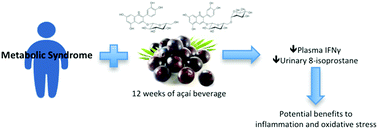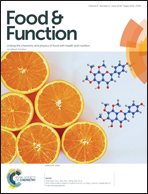Açaí (Euterpe oleracea Mart.) beverage consumption improves biomarkers for inflammation but not glucose- or lipid-metabolism in individuals with metabolic syndrome in a randomized, double-blinded, placebo-controlled clinical trial
Abstract
Açaí (Euterpe oleracea Mart.) berries, characterized by high polyphenol concentrations (predominantly anthocyanins), have demonstrated anti-inflammatory and anti-diabetic activities. The study objective was to determine the modulation of lipid and glucose-metabolism, as well as oxidative stress and inflammation, by an açaí-beverage (containing 1139 mg L−1 gallic acid equivalents of total polyphenolics) in 37 individuals with metabolic syndrome (BMI 33.5 ± 6.7 kg m−2) who were randomized to consume 325 mL twice per d of a placebo control or açaí-beverage for 12 weeks. Anthropometric measurements, dietary intake, and blood and urine samples were collected at baseline and after 12 weeks of consumption. Two functional biomarkers, plasma level of interferon gamma (IFN-γ) and urinary level of 8-isoprostane, were significantly decreased after 12 weeks of açaí consumption compared to the placebo control (p = 0.0141 and 0.0099, respectively). No significant modification of biomarkers for lipid- and glucose-metabolism was observed in this study. Findings from this small pilot study provide a weak indication that the selected dose of açaí polyphenols may be beneficial in metabolic syndrome as only two biomarkers for inflammation and oxidative stress were improved over 12 weeks. Follow-up studies should be conducted with higher polyphenol-doses before drawing conclusions regarding the efficacy of açaí polyphenols in metabolic syndrome.



 Please wait while we load your content...
Please wait while we load your content...